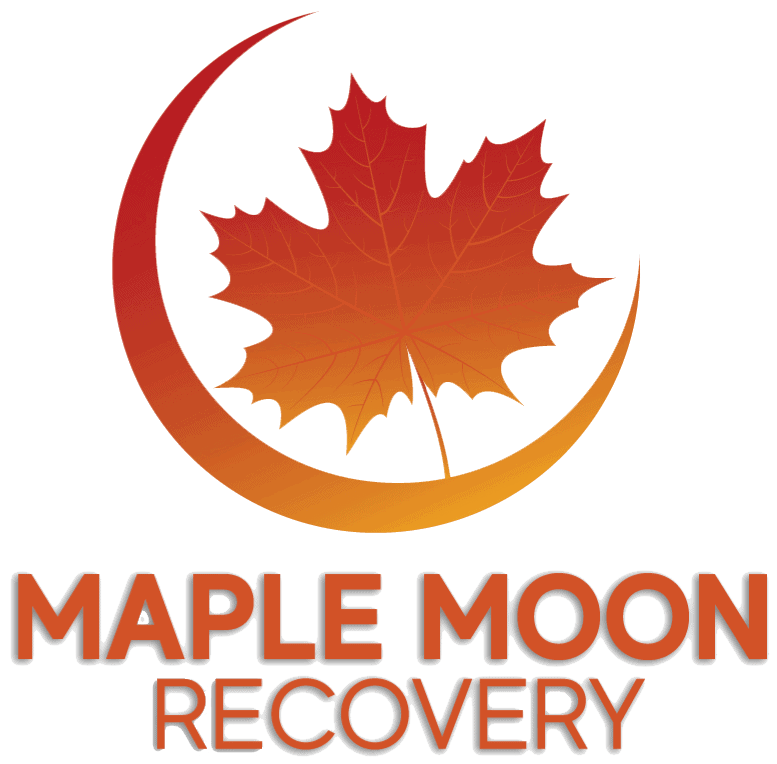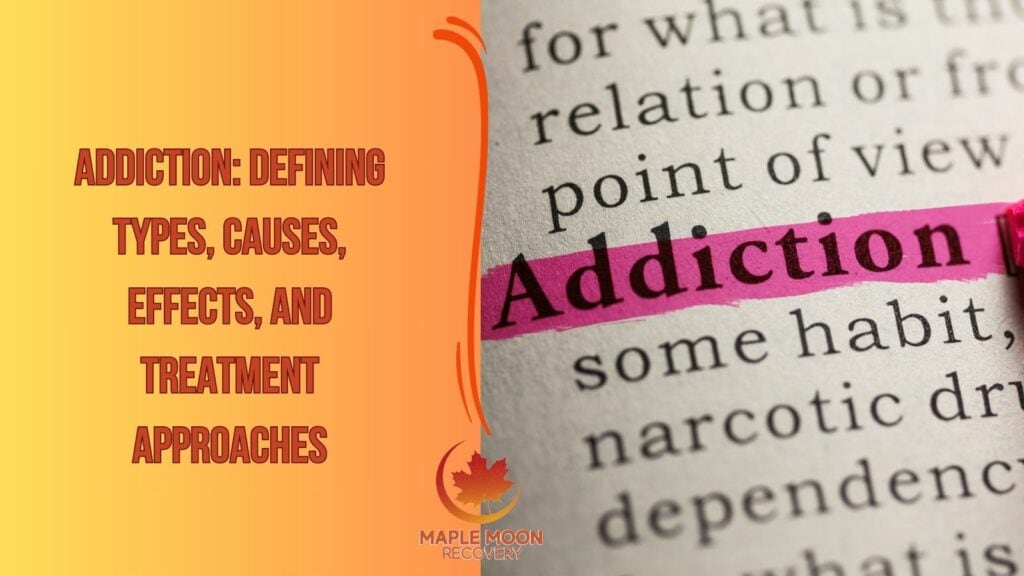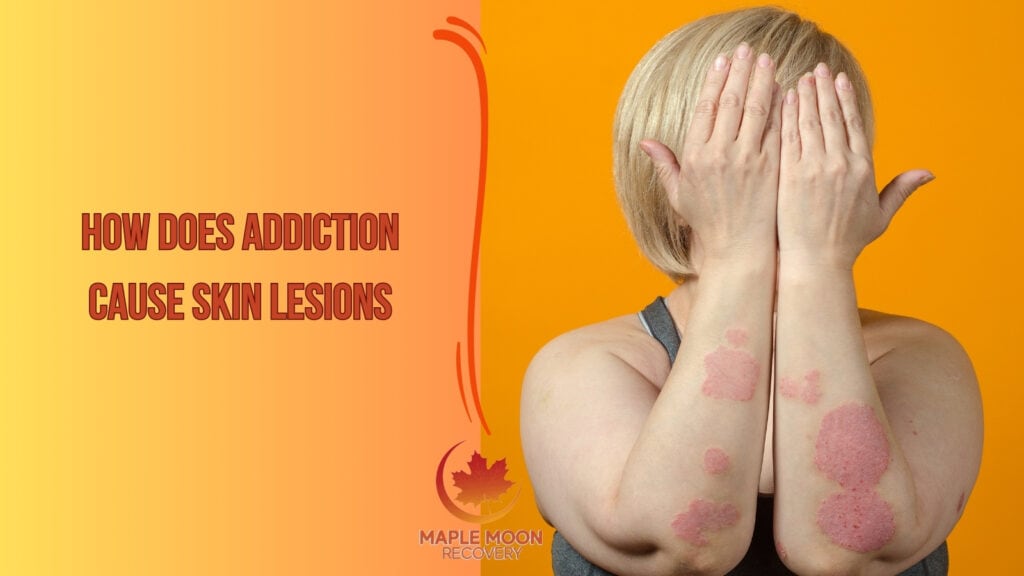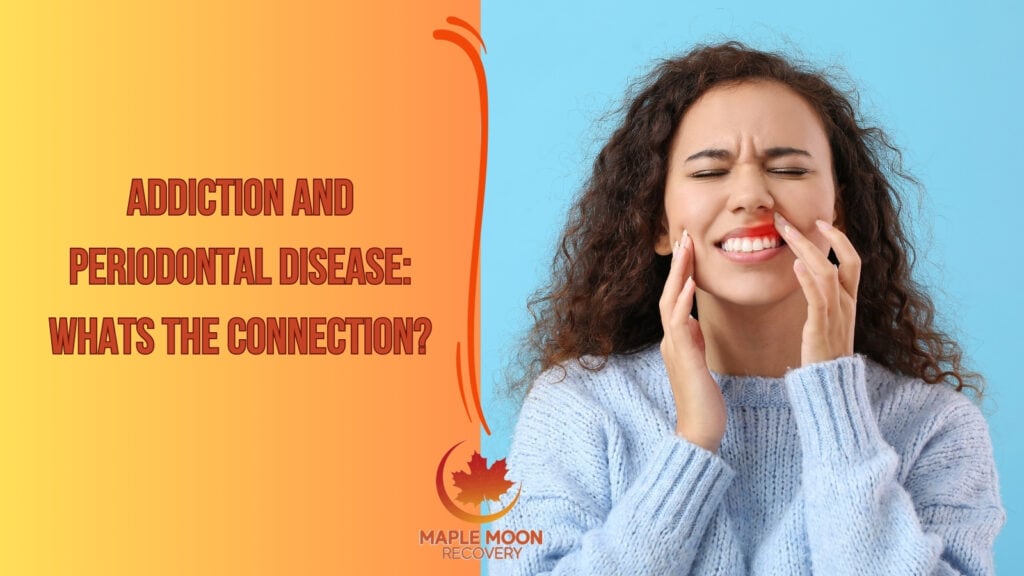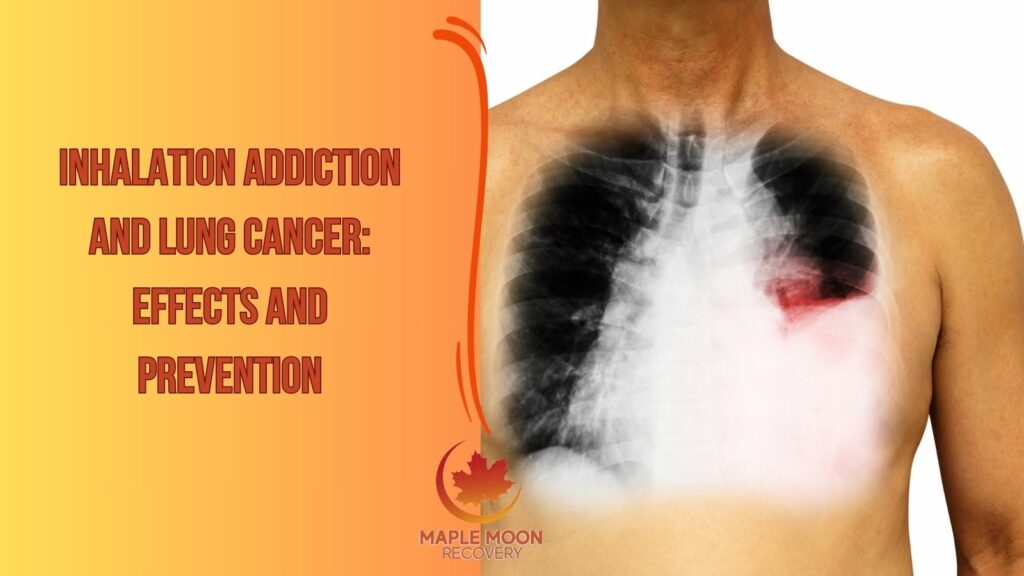Addiction is a chronic and relapsing brain disorder impacting the brain’s reward, motivation, and memory systems. It’s characterized by an intense craving for substances or behaviors, leading to compulsive and obsessive pursuits of “reward” despite potential consequences.
There are two main types of addiction: substance use disorders (SUDs), involving the misuse of drugs, and behavioral addictions like gambling disorder.
Signs and symptoms of addiction encompass psychological, behavioral, social, and physical indicators. Its causes include biological, genetic, environmental, and experiential components.
The outcomes of addiction are adverse, ranging from physical health issues to strained relationships, legal problems, and an increased risk of premature death.
Treatment approaches include medical detoxification, residential or outpatient treatment, behavioral therapies, pharmacotherapies, support groups, holistic therapies, family involvement, and aftercare planning, all aimed at aiding individuals in overcoming substance use disorders and maintaining long-term recovery.
What Is Addiction?
According to the American Society of Addiction Medicine, addiction is a treatable medical condition resulting from problematic substance use or behavior, influenced by intricate interactions among brain circuits, genetics, environment, and life experiences.
Addiction is a chronic brain disorder marked by the inability to regulate the use of legal or illegal substances or participate in certain behaviors, affecting a person’s behavior and decision-making skills.
Though initially a voluntary choice, addiction erodes self-control and endures despite adverse consequences.
There’s a customary belief that addiction stems from personal weakness, driven by a pursuit of pleasure and perpetuated by a lack of willpower to quit. Nevertheless, this simplistic view has been surpassed in medical and scientific circles.
Clinicians and researchers now acknowledge that many individuals turn to potentially addictive behaviors as a means of escaping physical or emotional discomfort. People often seek out experiences that provide pleasure or alleviate distress, leading to the roots of addiction lying in activities linked to seeking sensation and self-medication.
In everyday conversations, people often casually mention addiction, labeling themselves as “coffee addicts” or “workaholics.” Nonetheless, within clinical contexts, addiction holds exceptional weight.
Surprisingly, the term “addiction” did not appear in any prior versions of the American Psychiatric Association’s diagnostic manual, the reference book used by physicians and psychotherapists to identify mental health disorders, until the current edition, the Diagnostic and Statistical Manual of Mental Disorders, 5th Edition (DSM-5).
In this latest edition, addiction is identified as a category encompassing both substance use disorders, like alcohol use disorder, and non-substance use disorders, such as gambling disorder.
What Are the Types of Addiction?
Addiction presents itself in two primary forms:
- Substance Addiction: This category of addiction involves the misuse of drugs or alcohol, leading to both physical and psychological dependence. Commonly abused substances include alcohol, opioids, stimulants, and sedatives, as well as illicit drugs like cocaine and heroin.
- Behavioral Addiction: Behavioral addictions encompass fixational behaviors that provide a sense of reward or pleasure. Examples include gambling, excessive internet use, gaming, habitual shopping, and eating disorders such as binge eating or food addiction.
Despite the distinctions between substance use disorders and behavioral addictions, they share comformable traits such as compulsivity, loss of control, and persistence despite negative consequences. Furthermore, both types of addiction involve alterations in the brain’s reward systems.
Frequent examples of substance addiction include:
- Alcohol addiction
- Opioids (including prescription painkillers and heroin) addiction
- Nicotine (tobacco products) addiction
- Cocaine addiction
- Methamphetamine addiction
- Marijuana addiction
- Benzodiazepines addiction
- Stimulants (such as amphetamines) addiction
- Hallucinogen addiction
- Inhalant addiction
Frequent examples of behavioral addiction include:
- Gambling addiction
- Internet use addiction (including social media, gaming, and online shopping)
- Food addiction (like binge eating disorder)
- Sex addiction
- Exercise addiction (excessive or unhealthy amounts)
- Shopping addiction
- Work addiction (overworking or workaholism)
- Pornography addiction (fixation on pornography)
- Video games addiction
- Obsessional hoarding addiction
What Are the Causes of Addiction?
Addiction arises from a blend of genetic, environmental, and psychological factors.
- Genetic Predisposition: Genetic makeup influences an individual’s susceptibility to addiction. Specific genetic variations affect how one reacts to drugs or stimuli, heightening the likelihood of addiction development.
- Environmental Factors: Surrounding circumstances, like exposure to substance abuse, trauma, stress, and peer pressure, substantially shape addiction development. Negative childhood experiences, socioeconomic status, and the accessibility of addictive substances also amplify addiction risk.
- Psychological Factors: Mental health disorders, trauma, low self-esteem, and ineffective coping mechanisms contribute to addiction vulnerability. Individuals often resort to substances or behaviors as a means of self-medication or to alleviate emotional distress.
What Are the Effects of Addiction?
The effects of addiction permeate various facets of an individual’s life, extending beyond physical health and encompassing mental, relational, occupational, and financial well-being.
- Legal Issues: Addiction often leads to legal entanglements, including arrests, fines, and incarceration, stemming from activities such as drug possession, driving under the influence, or engaging in criminal behavior to support addiction.
- Social Stigma: Individuals grappling with addiction face societal stigma and discrimination, which exacerbate feelings of shame, guilt, and isolation, hindering their ability to seek help and support.
- Parental Challenges: Addiction has profound effects on parenting abilities, leading to neglect, instability, and trauma for children of parents struggling with addiction, potentially perpetuating cycles of substance abuse and dysfunction within families.
- Health Care Burden: Addiction places a massive burden on healthcare systems, resulting in increased healthcare utilization, emergency room visits, and hospitalizations due to substance-related injuries, illnesses, and overdoses.
- Education: Addiction interferes with educational attainment and academic success, leading to poor school performance, absenteeism, and dropout rates among individuals struggling with substance abuse or behavioral addictions.
- Legal Guardianship: In cases of severe addiction, individuals lose legal guardianship of children or dependents due to neglect, endangerment, or inability to provide a safe and stable environment.
- Self-Esteem Issues: Addiction often erodes self-esteem and self-worth, leading to feelings of inadequacy, hopelessness, and despair as individuals struggle to cope with the consequences of their addictive behaviors.
- Cultural Disparities: Cultural factors influence access to addiction treatment and support services, leading to disparities in care and outcomes among different demographic groups based on race, ethnicity, socioeconomic status, and geographic location.
- Loss of Identity: Addiction leads to a loss of identity as individuals become consumed by their addictive behaviors, neglecting their interests, hobbies, and values in favor of satisfying their cravings or compulsions.
- Pressure on Parent-Child Relationships: Addiction strains parent-child relationships, leading to feelings of betrayal, resentment, and mistrust as children struggle to understand and cope with their parent’s addictive behaviors and their impact on family dynamics.
- Legal Consequences: Addiction often results in legal repercussions such as fines, probation, and criminal records due to activities related to substance abuse, including theft, possession, or distribution of illicit drugs.
- Impact on Community: Addiction adversely affects communities by contributing to crime, violence, homelessness, and other social problems, straining community resources, and fostering an environment of fear, distrust, and instability.
What Are the Treatment Approaches for Addiction?
Treating addiction involves a multifaceted approach, drawing on various evidence-based methods to address the complex nature of the condition. Beyond the standardly known treatment modalities, such as behavioral therapies and medication-assisted treatment, there are several other approaches:
- Behavioral Therapies: Cognitive-behavioral therapy (CBT), dialectical behavior therapy (DBT), motivational interviewing (MI), and contingency management (CM) are typically used in addiction treatment to help individuals discern and modify unhealthy thoughts, behaviors, and patterns associated with addiction.
- Medication-Assisted Treatment (MAT): MAT combines behavioral therapies with medications like methadone, buprenorphine, naltrexone, and disulfiram to reduce cravings, manage withdrawal symptoms, and prevent relapse in individuals with substance use disorders.
- Support Groups: Support groups such as Alcoholics Anonymous (AA), Narcotics Anonymous (NA), and Gamblers Anonymous (GA) provide peer support, encouragement, and accountability for individuals in recovery, fostering a sense of community and offering practical strategies for maintaining sobriety.
- Residential Treatment Programs: Residential or inpatient treatment programs offer intensive, round-the-clock care within a structured environment. These programs include individual therapy, group counseling, educational sessions, and recreational activities to support recovery and rebuild life skills.
- Holistic Therapies: Holistic approaches to addiction treatment integrate complementary therapies such as yoga, meditation, acupuncture, art therapy, and mindfulness practices. These therapies address the mind-body connection, promote relaxation, reduce stress, and enhance overall well-being during the recovery process.
- Family Therapy: Family therapy involves the participation of family members in the treatment process to address dysfunctional family dynamics, improve communication, set boundaries, and support the individual’s recovery journey while addressing underlying family issues contributing to addiction.
- Motivational Enhancement Therapy (MET): MET is a counseling approach that focuses on enhancing an individual’s motivation and commitment to change addictive behaviors by exploring their ambivalence, identifying personal goals, and strengthening their self-efficacy.
- Dual Diagnosis Treatment: Dual diagnosis treatment addresses co-occurring mental health disorders alongside addiction, providing integrated care to address both conditions simultaneously and improve treatment outcomes.
- Twelve-Step Facilitation: Twelve-step facilitation involves guiding individuals through the principles and practices of twelve-step programs like AA or NA, emphasizing acceptance, surrender, and spiritual growth as essential components of recovery.
- Pharmacotherapy for Co-occurring Disorders: Pharmacotherapy is used to treat co-occurring mental health disorders alongside addiction, utilizing medications to alleviate symptoms and stabilize mood, reducing the risk of relapse.
- Peer Recovery Coaching: Peer recovery coaches, who are individuals with lived experience of addiction and recovery, provide support, guidance, and advocacy to individuals in recovery, helping them navigate challenges, access resources, and build a fulfilling life in sobriety.
- Relapse Prevention Planning: Relapse prevention planning involves identifying triggers, developing coping strategies, and creating a comprehensive plan to prevent relapse and maintain long-term sobriety.
- Community-Based Support Services: Community-based support services, such as sober living homes, vocational training programs, and job placement services, provide individuals in recovery with ongoing support, structure, and opportunities for social reintegration.
- Trauma-Informed Care: Trauma-informed care admits the prevalence and impact of trauma on addiction and recovery, providing a safe and supportive environment that addresses past traumas, promotes healing, and empowers individuals to build resilience and self-efficacy.
- Telemedicine and Online Support: Telemedicine and online support platforms offer convenient access to addiction treatment services, counseling, support groups, and educational resources, particularly beneficial for individuals in remote areas or those unable to attend in-person appointments.
How Does Genetics Affect the Development of Addiction?
Genetics plays a significant role in the development of addiction, influencing susceptibility to substance abuse and dependence. Here’s how genetics affects addiction:
- Genetic Predisposition: Genetic factors contribute to an individual’s vulnerability to addiction. Studies have shown that addiction tends to run in families, with a higher risk observed among individuals with a family history of substance abuse.
- Gene Variants: Specific genetic variations, or polymorphisms, can influence an individual’s response to drugs or alcohol. These variations may affect the metabolism, distribution, and neurotransmitter systems in the brain, altering the subjective effects of substances and increasing the likelihood of addiction.
- Neurotransmitter Systems: Genetic factors can impact neurotransmitter systems involved in reward, pleasure, and reinforcement, such as dopamine, serotonin, and endorphins.
How do cultural factors influence addiction?
Cultural factors shape attitudes toward substance use and addictive behaviors. Cultural norms, beliefs, and practices regarding alcohol, drugs, gambling, and other addictive activities influence individuals’ likelihood of engaging in these behaviors. For example, cultures with permissive attitudes regarding alcohol consumption have higher rates of alcohol addiction. Conversely, cultures that stigmatize addiction deter individuals from seeking help or acknowledging their struggles.
Does substance addiction and behavioral addiction affect physical health differently?
Yes, addiction has varying impacts on physical health depending on if its substance or behavioral addiction. For example, substance addictions like alcoholism create liver damage, cardiovascular issues, and neurological impairment. In contrast, a behavioral addiction such as a gambling disorder results in stress-related conditions, insomnia, and gastrointestinal problems.
How does drug addiction affect the brain of an addict?
Drug addiction significantly alters the brain’s structure and function, primarily affecting areas involved in reward, motivation, learning, and memory. Substances like opioids, cocaine, and alcohol artificially flood the brain with dopamine—a neurotransmitter linked to pleasure and reward—leading to heightened feelings of euphoria. Over time, the brain adapts to these high levels of dopamine by reducing dopamine production and the number of dopamine receptors in the brain, making it increasingly difficult to experience pleasure from normal activities. This alteration impairs an individual’s ability to make decisions, control impulses, and regulate emotions, reinforcing the cycle of addiction as the brain becomes increasingly reliant on the drug to function.
How does trauma influence the development and treatment of addiction?
Trauma drives both the development and treatment of addiction. Individuals who have experienced trauma, such as physical or emotional abuse, neglect, or exposure to violence, turn to substances or behaviors as a way to cope with their pain and distress. Trauma-informed approaches to addiction treatment recognize the ramifications of trauma on individuals’ lives and incorporate strategies to address trauma-related symptoms and triggers.
